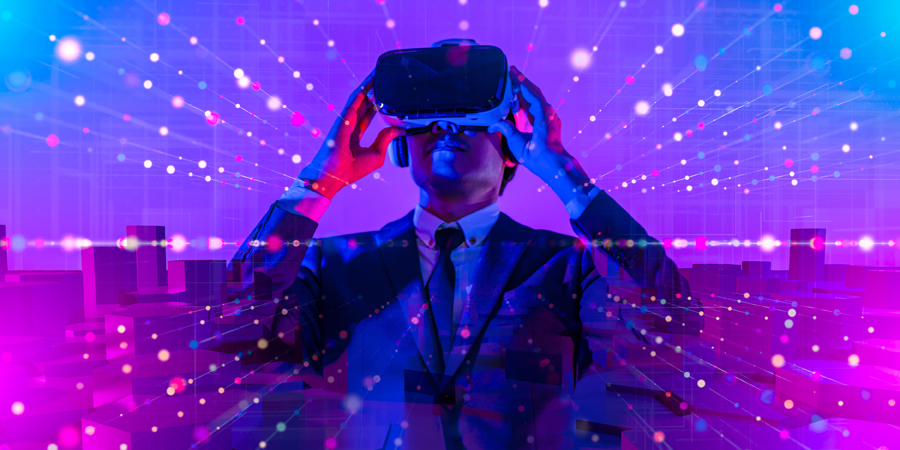
In February this year, ArentFox Schiff announced that it had become the first major U.S. law firm to “join the Metaverse” by acquiring a land site in Decentraland, a fact that underscored how seriously lawyers are taking one of the latest technology trends. Technologist and futurist Joseph Raczynski of Thomson Reuters Legal talks about how the Metaverse will impact the legal space, and what lawyers should do to prepare.
ALB: You’ve written previously about the Metaverse and the preparedness of lawyers. How widespread do you think the use of this will be in the near future, and how can lawyers make sure they are sufficiently prepared?
Joseph Raczynski: If by the near future we are saying three to five years, I would say 100 percent that the Metaverse will be used in various forms by the majority of the population in the industrialized world. It has already started. There are two forces at play that are enabling the Metaverse: One, blockchain, which is a unique way to store information in a provable, unalterable way. Second, the emerging hardware is key. When Apple releases its Virtual Reality or Mixed Reality headset in the coming year or so, it will force all of us to head into the Metaverse. Just for perspective, VR is fully immersive, while MR allows you to see the physical world and places digital imagery on top of that.
I have likely spoken to thousands of lawyers over the last several years. They are extraordinarily bright, but with one limiting factor - their dedication to their craft. This means that they do not have the time to lift their heads to see what is coming. All these emerging technologies will impact their practices in some way, as well as the business of law. At a minimum, lawyers need the opportunity to focus on the big four: AI, blockchain, workflow, and the grab bag of general emerging technology. There are a multitude of places to learn about these things, but I would include some of the classics such as Google Alerts, Twitter threads on these topics, and magazines like Wired, which should be a staple for everyone.
ALB: What kind of opportunities could the Metaverse bring to lawyers?
Raczynski: Imagine a world, much like what we have now, but only digital. It is nearly as immersive and interactive. Then, extrapolate all the problems, issues, benefits, and challenges we have currently in real life, and think about where lawyers play a role. It will be similar. In the beginning, much of the involvement of lawyers will be around IP issues and copyright. Soon thereafter, insurance and contractual disagreements will ensue, but these contract issues could be interesting because of the nature of the platform a Metaverse will be built upon. Since it should rely on blockchain and smart contracts, these disputes could likely be easier to solve at a lower tier, leaving lawyers to resolve more complex issues.
ALB: How does our engagement with digital worlds and environments shape the way we work and the kind of work we carry out?
Raczynski: If we presume we are moving increasingly into a digital world, then every nuance surrounding that space will become increasingly important. Start with AI. Algorithms will increasingly be able to make decisions for us. Yes, this includes much of the legal work out there. These algos start off simply, but will become far more complex, freeing us from some decisions or work.
Stack on top of that blockchain, which is trustless (as in, you don’t have to trust a third-party) database, meaning both AI and blockchain can work in tandem to begin doing some pretty impressive workflows that are automated. When we move into the Metaverse for both fun and business, everything can be quantified, e.g. a house, shoes, art, tickets to a concert, via an NFT (non-fungible token) which uses a blockchain. Processes will increasingly be leveraging data and AI to make decisions which will rely less on human intervention.
I know this can sound frightening, and it could be, which is why as this progresses we need the best legal minds to understand the implications, yet keep a progressive mindset to guide the path forward. We do not merely wish to replicate everything we have in the real world, but try to evolve it to the best we humanly can.
法律家とメタバース
今年の2月、アレントフォックス・シフ(ArentFox Schiff)法律事務所がディセントラランドでランドを取得した「メタバ ースに参加する」米国の大手法律事務所第1号となったことを発表し、法律家たちがこの最新のテクノロジートレンドを真剣に受け止めているという事実が明らかになった。トムソン・ロイター・リーガルのテクノロジストで未来学者のジ ョセフ・ラチンスキー(Joseph Raczynski)に、メタバースが今後いかに法律の領域に影響を与え、法律家はどのような準備をすべきかについて話を聞いた
ALB:以前、メタバースと法律家の備えについてお書きになっていましたが、メタバ ースの利用は近い将来どの程度広がり、それに対して法律家はどうすれば十分な備えができるとお考えですか。
ジョセフ・ラチンスキー(以下ラチンスキ ー):3~5年後の近い将来には、先進国の人口の大半が、様々な形でメタバースを利用することになると100%確信しています。利用はすでに始まっています。メタバースを実現させる推進力は2つあります。1つ目はブロックチェーンです。ブロ ックチェーンは情報を証明可能かつ変更できない方法で保存できる、ユニークな仕組みです。2つ目のカギは新たなハードウェアです。Apple社が来年あたりに仮想現実(VR)または複合現実(MR)のヘッドセットを発売すれば、誰もがメタバースを使わざるをえなくなるでしょう。ちなみに、VRは没入感が高い体験を提供しますが、MRでは現実世界を見ることができ、そこにデジタル画像が重なります。
私はここ数年で何千人もの法律家と言葉を交わしました。彼らは非常に優秀ですが、自分の職務に打ち込みすぎるという制限要素があります。つまり、新しいものに目を向ける時間の余裕がないのです。新しいテクノロジーは弁護士としての仕事にも法務事業にも何らかの影響を及ぼします。少なくとも、法律家はAI、ブロ ックチェーン、ワークフロー、多種多様な新興テクノロジー一般の4大要素に注目する必要があります。これらについて学ぶ方法はたくさんありますが、Googleアラ ートやTwitterのスレッドでこれらのトピ ックについてチェックしたり、Wired等の雑誌を読んだりするのが一般的には必須ではないでしょうか。
ALB:メタバースで法律家はどのような機会を得るのでしょうか。
ラチンスキー:今私たちがいる世界のデジタル版をイメージしてください。現実世界と同じくらい没入できてインタラクティブな世界です。そして、実生活で私たちが抱えるすべての事象、問題、メリット、課題を想定し、それに対して法律家がどのような役割を果たせるのかを考えます。現実と同様ですが、初期は法律家が関わる部分の多くをIPの問題や著作権が占めるでしょう。その後すぐに、保険や契約における意見の対立を扱うようになるでしょうが、メタバースの基礎となるプラットフォ ームの性質により、こうした契約の問題は興味深いものになる可能性があります。メタバースではブロックチェーンとスマートコントラクトを使用するため、このような紛争は早い段階で上の人々の関与なく簡単に解決できることが多く、法律家はより複雑な問題の解決に集中できるようになります。
ALB:法律家とデジタル世界および環境との関わりによって、私たちの働き方、そして私たちが遂行する業務の種類はどのように形を変えるでしょうか。
ラチンスキー:デジタル世界への移行が進んでいくと仮定すると、デジタル空間を取り巻くあらゆる細かな要素がますます重要になっていくでしょう。まずはAIです。
アルゴリズムが人の代わりに意思決定を行えるようになります。これには法務関連の大部分の業務も含まれます。アルゴリズムはシンプルなものから始まりますが、徐々に複雑さを増し、法律家は一部の意思決定や業務から解放されます。
さらに、トラストレス(サードパーティを信頼する必要がない)データベースであるブロックチェーンがこれに加わります。つまり、AIとブロックチェーンが連動して、自動化された優れたワークフローを実行します。娯楽とビジネスの両方でメタバースに移行すると、ブロックチェーンを使用するNFT(非代替性トークン)を介してあらゆるもの(家、靴、アート、コンサートチケット等)を定量化することができます。プロセスはますますデータとAIを活用して、人間の介入なしで意思決定を行うようになります。
これは恐ろしく聞こえるかもしれません。また、実際に恐ろしい状況になる可能性もあり得るので、テクノロジーが進化を重ねるにつれ、私たちは影響を推測する最善の法的解釈をできるようにしつつ、前進し続ける姿勢を大切にする必要があります。単に現実世界にあるものをすべて再現するのではなく、人間にとって可能な限り最善の世界へと進化させようとするのです。


